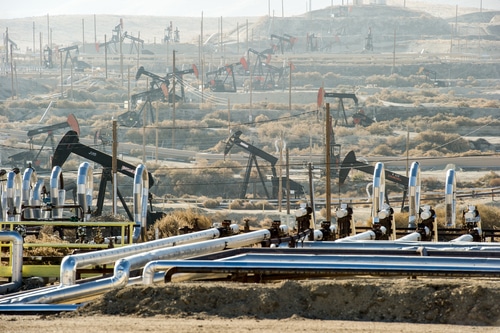Even though a sizable majority of Californians favor a moratorium on fracking until its impacts on the environment and human health are better understood, California’s fracking moratorium bill, SB 1132, died in the state Senate last week, voted down for the final time on Friday evening.
Four Democrats joined all 12 Republicans in voting nay on Friday, while five more Dems abstained, making the final vote 16 to 16. A simple majority of the 40-member body was needed to pass (three Senators are currently suspended and unable to vote).
Big Oil spent big to defeat this bill. The Western States Petroleum Agency, widely regarded as the most powerful corporate lobbying group in Sacramento, spent $1.5 million lobbying the state government in the first three months of 2014 alone (and according to Truth Out, the WSPA spent $4.7 million in 2013, more than any other group). A statewide coalition of environmental groups called Californians Against Fracking estimates that, all told, the oil industry has spent $15 million lobbying state legislators to stop SB 1132 from becoming law.
It would appear that Big Oil got what it paid for. According to a DeSmogBlog analysis of contributions from fossil fuel interests to California State Senators, those who voted no have taken some 370% as much money in campaign contributions from the oil industry as did those voting yes.
Over their lifetime, the 16 Senators who voted against SB 1132 have taken $590,185 from the oil industry, while the 16 who voted no have taken $159,250.
This data is via Oil Change International’s Dirty Energy Money database, and only tallies contributions made through 2012, the last year campaign contribution numbers are available.
The numbers paint a clear picture: Money talks in Sacramento, and oil companies are throwing around plenty of it.
“Despite overwhelming public support for a moratorium on fracking in the State, Senators chose to listen to their Big Oil benefactors over the demands of their constituents,” says David Turnbull, Campaigns Director for Oil Change International.
Turnbull argues that the demise of SB 1132 indicates that Big Oil has thoroughly “taken control” of the California State Senate, and that it may be time for Governor Jerry Brown to step in:
“Governor Brown now has an opportunity prove his climate leadership and concern for the voters who elected him by doing what the Senate was unable to do: stand up to Big Oil and protect Californians by putting a stop to fracking in our state.”
Many counties and municipalities in California are not waiting for the governor or the state legislature to take action and have gone ahead with passing their own bans on fracking. Many more local governments in the state plan to have votes on banning fracking soon.
Update: The LA Times crunched the data on campaign contributions too, and while their numbers came out slightly different from what we found, they reached the same conclusion: “Oil money flowed to Calif. senators who blocked fracking moratorium”
Photo by Christopher Halloran / Shutterstock.com
Subscribe to our newsletter
Stay up to date with DeSmog news and alerts






